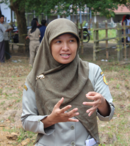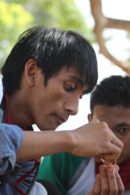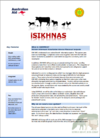About iSIKHNAS: Perbedaan revisi
(Created page with "iSIKHNAS is Indonesia’s new animal health information system. The system uses every day technology in simple but clever ways to gather data from the field and make it immed...") |
(→Download brochure) |
||
| (32 revisi antara oleh 2 pengguna tidak ditampilkan) | |||
| Baris 1: | Baris 1: | ||
| − | iSIKHNAS is Indonesia’s new animal health information system. The system uses every day technology in simple but clever ways to gather data from the field and make it immediately available to users and stakeholders in ways that are readily useful and meaningful. | + | {{languages|About iSIKHNAS}} |
| + | =About iSIKHNAS= | ||
| + | [[Image:Exam_of_mouth.png|130px|left]] | ||
| + | |||
| + | [[Image:Female_vet.png|frameless|130px|left]] | ||
| + | |||
| + | [[Image:Paravet_with_sample5.png|130px|left]] | ||
| + | |||
| + | [[Image:IMG_7065.jpg|130px|left]] | ||
| + | |||
| + | iSIKHNAS is Indonesia’s new animal health information system. The system uses every day technology in simple but clever ways to gather data from the field and make it immediately available to users and stakeholders in ways that are readily useful and meaningful. | ||
| + | |||
| + | iSIKHNAS puts the field staff at the centre of the system because they are in closest touch with the livestock, owners and their communities. Their role is crucial to the success and strength of iSIKHNAS. Their record of the cases they see, the actions and decisions they take as well as the outcomes of cases is quickly, simply and easily transmitted to iSIKHNAS and then iSIKHNAS goes to work to manage, report and analyse the data. Farmers benefit from the system by receiving better and more rapid service from the field staff. The field staff benefit because they can offer a better service, target their efforts better, keep better informed and stop spending so much time doing administrative work. iSIKHNAS supports para-vets to build stronger relationships with livestock owners, vets can target the priorities and resources better, and management can make better decisions based on accurate and up to date data. It is a win-win-win for everyone. | ||
In addition, iSIKHNAS will integrate several existing information handling systems to make them more efficient and available to more users. The integration of these systems will make their data all the more powerful and will greater support the work of our decision makers at all levels. | In addition, iSIKHNAS will integrate several existing information handling systems to make them more efficient and available to more users. The integration of these systems will make their data all the more powerful and will greater support the work of our decision makers at all levels. | ||
| Baris 7: | Baris 19: | ||
Using iSIKHNAS, we will be able to link laboratory submission data with disease reports, maps with movement data or outbreak reports, slaughter data with production and population data, and all smoothly and automatically. That is great for decision makers at every level and good for everyone who is working in the animal health sector. | Using iSIKHNAS, we will be able to link laboratory submission data with disease reports, maps with movement data or outbreak reports, slaughter data with production and population data, and all smoothly and automatically. That is great for decision makers at every level and good for everyone who is working in the animal health sector. | ||
| + | ==[[Media:What_is_iSIKHNAS v6 ENG.pdf|Download brochure]]== | ||
| − | + | [[Image:What_is_iSIKHNAS v5.png|100px|left]] | |
| − | [[Image: | + | [[Media:What_is_iSIKHNAS v6 ENG.pdf|Click here to download a PDF brochure about iSIKHNAS.]] |
| − | [[Media:What_is_iSIKHNAS.pdf| | ||
Revisi terkini pada 8 Oktober 2014 09.19
| Language: | English • Bahasa Indonesia |
|---|
About iSIKHNAS
iSIKHNAS is Indonesia’s new animal health information system. The system uses every day technology in simple but clever ways to gather data from the field and make it immediately available to users and stakeholders in ways that are readily useful and meaningful.
iSIKHNAS puts the field staff at the centre of the system because they are in closest touch with the livestock, owners and their communities. Their role is crucial to the success and strength of iSIKHNAS. Their record of the cases they see, the actions and decisions they take as well as the outcomes of cases is quickly, simply and easily transmitted to iSIKHNAS and then iSIKHNAS goes to work to manage, report and analyse the data. Farmers benefit from the system by receiving better and more rapid service from the field staff. The field staff benefit because they can offer a better service, target their efforts better, keep better informed and stop spending so much time doing administrative work. iSIKHNAS supports para-vets to build stronger relationships with livestock owners, vets can target the priorities and resources better, and management can make better decisions based on accurate and up to date data. It is a win-win-win for everyone.
In addition, iSIKHNAS will integrate several existing information handling systems to make them more efficient and available to more users. The integration of these systems will make their data all the more powerful and will greater support the work of our decision makers at all levels.
Indonesia has several existing systems which have managed data for single purposes including InfoLab for laboratory data and the original SIKHNAS for field disease reports. These systems lacked real power because they were not connected. iSIKHNAS is bringing these systems together so that their data is able to be more efficiently managed and shared by all stakeholders. The data will be made available to authorised users through a variety of means such as the iSIKHNAS website or via the reports, charts, spread sheets and maps created by the system and sent by email or SMS to staff who require them.
Using iSIKHNAS, we will be able to link laboratory submission data with disease reports, maps with movement data or outbreak reports, slaughter data with production and population data, and all smoothly and automatically. That is great for decision makers at every level and good for everyone who is working in the animal health sector.





